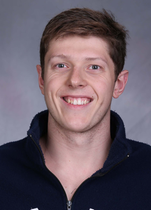NAC alums Alex Goss and Michelle Chintanaphol are in their Senior season at Yale University. Prior to their seasons starting, the two were selected by their teammates to be captains of the Men’s and Women’s swim teams for the 2016-2017 season. After exceptional careers at NAC, we caught up with the two of them and asked them a few questions about what life as a student-athlete is like and how their development through NAC helped them prepare them for their time as a collegiate athlete.
How did your experience at NAC set you up to be both a student and an athlete at Yale?
Alex: I could go on forever about the lessons I learned at NAC, but one thing John, Doug, and the rest of the coaching staff teach particularly well is the importance of preparation. Through my last four years at Yale, it’s become increasingly obvious that it’s not the best recruits or the smartest kids that are successful, it’s the ones who are willing to put in the work. I firmly believe that anyone can thrive as student and an athlete, even at an institution as challenging as Yale, you just need to stay focused and follow the process.
Michelle: Throughout high school, I learned how to balance school, swimming with NAC, and extracurricular activities. Without that challenge, I would have been less likely to delve into other clubs and activities that have truly added to my Yale experience. Swimming was and is a huge part of my pre-collegiate and collegiate life, but I am thankful that I have other experiences to draw from.
How did your experience at NAC help prepare you to be a leader for the Yale team?
Alex: One of the values stressed to me at NAC was an attention to detail. There are so many distractions in college that it’s easy to forget about the little things, but there’s nothing people respect more than leadership by example. If you’re the first one in the water and stay late doing extra conditioning, people will follow your lead regardless of how fast you are.
Michelle: NAC always felt like a family, and with that environment, competition was never winning for the sake of beating a teammate. We were competitive in a way that we pushed each other to be better and achieve our goals. NAC instilled a strong sense of team unity and hard work in me, and I hope this has translated to how I have been able to lead for Yale women’s swimming and diving team.
In your transition from NAC to a collegiate team, what has been the most valuable lesson you have learned?
Alex: If you want to be successful in swimming, you have to be consistent. This is especially true in college, where league titles are decided by in-season dual meets. Everyone is tired. Everyone is sick. Everyone is broken down. At the end of the day, the competition doesn’t care, and they hope all the above are true. As an athlete, you have an opportunity to fight through these obstacles and grow stronger as you overcome them. Andrew Heymann, the captain of Yale in 2015 and now a Special Forces officer in the Navy, always said that you must be your best in your darkest moments. Whether it be in athletics or academics, the people at the top of their field are the ones who find a way to get the job done regardless of the circumstance.
Michelle: Whenever there is a huge change in training and lifestyle, you learn so much about what works and what does not. I think to ease the transition, you must be willing to adapt and understand that improving mentality, attitude, work ethic, and consistency is necessary to swim faster.
In your transition from High School to College academics, what has been the most valuable lesson you have learned?
Alex: Time management is vital if you want to be successful. Even at Yale, which brings in the most determined and ambitious the world has to offer, you would be shocked how much people procrastinate. Having role models to look up to on NAC taught me that just because you have athletic and academic goals doesn’t mean you need to sacrifice one or the other, you just have to plan ahead. Looking back on it, waking up at 4 A.M. to go to practice on the same morning as a test was a huge challenge, but it also taught an important lesson: you have to plan ahead.
Michelle: I think often the stress of college academics is often ignored when high school students are preparing for the transition to college. While balancing sports, school, clubs, and social life can be overwhelming, it is essential to know how to handle stress. Each person’s method of relaxing is different, whether it be hanging out with friends or spending time alone. I think college academics are manageable once you realize that you must prioritize school and dedicate time to relax. 






